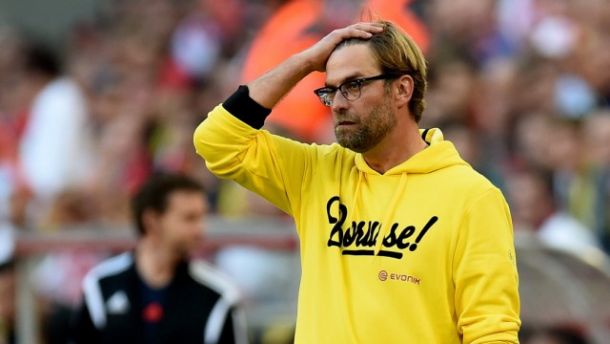As Borussia Dortmund trudged off the Weserstadion turf after the final game of 2014, there was not even any great sense of surprise anymore. Shock? Yes, obviously, but not that completely out-of-the-blue hammerblow effect of an unexpected loss to a vastly inferior team, but rather a continuing tremor in the wake of a Hinrunde that has shaken everyone associated with BVB to the absolute core.
The truth is, their 2-1 loss to hosts Werder Bremen just highlighted all their faults - A frustrating broken tape reel of virtually every single one of the incredible 10 losses they had endured so far in this particular Bundesliga campaign. The words ‘unmitigated disaster’ has never been as apt, as descriptive and as true as in this case.
“We are standing here like a bunch of idiots, and it is completely our fault”, leader and icon, manager Jürgen Klopp, stated after the game. That one sentence sums it all up, but also adds to the bewilderment of everyone who followed Die Schwarzgelben over the past few years and more. This season promised much - The exit of Robert Lewandowski was bitter, of course, but it seemed that Borussia Dortmund had done everything possible to replace him by signing Adrian Ramos, who lit up opposition defenses in his time with Hertha Berlin, and Ciro Immobile, who was Capocannoniere, or Serie A top goalscorer, last season.
Add to that the coming return of their midfield fulcrum Ilkay Gündogan and eventually also Jakub Blaszczykowski, among others, and there seemed to be much cause for optimism. Let us not forget, BVB were absolutely decimated by injury in 2013-2014, yet still easily came second domestically while nearly knocking out eventual Champions Real Madrid in the quarter-finals of the UEFA Champions League. This side should have easily been capable of at least replicating their achievements last season, surely? The club had endured to loss of a key player before - Mario Götze - so two high quality strikers would be able to replace their former Polish hitman up top?
On paper, yes, but unfortunately football is played on grass - Where unpredictable bounces can thwart even the best laid plans. Statistics alone could never tell the whole story of how important Robert Lewandowski was to Borussia Dortmund - In pure sporting terms, his loss is more damaging than that of Mario Götze (And potentially Marco Reus in the future). The Pole was not only a dead-eye finisher, but a creator as well - With an unrivaled ability to hold up play and invite late runs from midfielders which decimated opposition defenses. Without him, BVB lost the one thing they could always rely on: The ability to score a lot of goals, and win games even if their defense was breached on a number of occasions.
However, the signs were there - The finishing of Robert Lewandowski and Marco Reus when fit papered over the fact that Die Schwarzgelben created many good chances, yet took only a small proportion thereof. The main culprit, Henrikh Mkhitaryan, has the ability and skill to become one of the best players in world football, yet his dire finishing has let himself and his club down on numerous occasions - But scapegoating really is not a solution, for every BVB attacker has been guilty of extreme profligacy in front of goal at one stage or another, even the vastly improved Pierre-Emerick Aubameyang, who has top scored so far for the club.
This has directly contributed to the problem that has plagued Borussia Dortmund the most this season, and to a lesser extent in previous campaigns as well: Defense. Die Schwarzgelben have hemorrhaged goals, conceding 26 in just 17 games - And this is a team in the last sixteen of the UEFA Champions League, incredibly. The root cause seems to be an unending inline of individual errors and an extreme lack of concentration, which is hard to explain given the domestic and European experience within their defensive ranks (Excluding Erik Durm, of course).
Both Neven Subotic and Lukasz Piszczek been shadows of the defenders they once were after lengthy injury lay-offs for an Anterior Cruciate Ligament tear and hip problem, respectively, while another contributing factor could be that given the team's struggles in front of goal, the full-backs are almost constantly pushed up high on the pitch, which inevitably makes BVB vulnerable to a counter-attack. The fact that their two best defenders, currently, in Mats Hummels - Whose leadership, by the way, as new club captain has been worrying, to say the least - and Sokratis Papastathopoulos are constantly injured and have barely been able to play in tandem has not helped at all. Everything is linked in some way, with the snowball-effect perhaps being started by the early-season struggles of goalkeeper Roman Weidenfeller, which has led to the introduction of Mitchell Langerak only serving to disrupt the little communication there is at the back even more.
Of course, no dissection of the fortunes of Borussia Dortmund would be complete without mentioning injuries, with it already being alluded to in the aforementioned look at their their defensive issues. Where injuries have hit them the hardest, though, is in their midfield - Ilkay Gündogan is back in action, but still not quite up to speed, while Nuri Sahin also still needs to find his feet after a knee problem. This has forced Jürgen Klopp to play 34-year-old Sebastian Kehl on a weekly basis, and Sven Bender, who constantly struggles with niggling injuries and knocks while not being in the mould of creating from a deeper midfield position - Something BVB desperately needs.
Shinji Kagawa is still not properly conditioned, while Marco Reus has experienced some extreme bad luck with multiple ankle ligament injuries in the span of a few months. All these problems lead to fatigue for players constantly being asked to play 90 minutes, and a lack of cohesion and sharpness when recently injured player have to enter the fray once again. In seasons past, the high amount of injuries was attributed to the intense gegenpressing preached by Jürgen Klopp, but alarmingly there has only been half-hearted attempts throughout the Hinrunde to put pressure on the ball, incomparable to the rabid hunting-in-packs we saw in those two great title-winning seasons and the memorable run all the way to the UEFA Champions League final. Is this all just a result of progressive fatigue catching up to a group of players who had experienced great physical stress in prior campaigns, or is there something else, something once unthinkable: A lack of motivation?
Borussia Dortmund forged its reputation and success on heart, resilience and a never-say-die attitude, which has become a hallmark of the club ever since their all-too close flirtation with bankruptcy in the early-to-mid 2000’s. For the past five years, Die Schwarzgelben had been the only constant thorn in the side of the mighty Bayern Munich, with this rivalry quickly capturing the imagination of football fans far and wide. But a legitimate question that can now be asked is whether the Bavarians have finally ‘broken’ their Westphalian rivals, just like they did Borussia Mönchengladbach, Hamburger SV, Werder Bremen, Bayer Leverkusen and a few other pretenders over the past five decades.
The spectacularly ill-timed announcement of the sale of Mario Götze to Bayern Munich has been well documented, and it is not even necessary to go into details - But it signalled the beginning of the end for BVB, in a way. A certain Karl-Heinz Rummenigge will insist that the young German is, in fact, by birth a native of Munich, but everyone knows he was Borussia Dortmund through-and-through, and the men at Säbener Straße had cruelly ripped the heart out of the team in black-and-yellow. It is much easier to replace purely a player than an ethos and personality, and it has been clear that they lost something on the pitch, some of that desire and unending drive - And most crucially of all, character.
Things were still going quite well last season, though, with Jürgen Klopp still managing to put his incredible, almost magical powers of motivation to good use in order to make squad players like Oliver Kirch and Manuel Friedrich play like world-beaters. But a nagging feeling remains that with the loss of Robert Lewandowski, even the manager has become a mere mortal - Weighed down by the unending and, quite frankly, unwinnable battle that rages on in the Bundesliga.
It has been noticeable that some of the BVB players have just simply switched off in games this season, leading to ridiculous goals being conceded or great opportunities being left begging, which is in stark contrast to the intense and single-minded Borussia Dortmund of old, which projected the image of a dog constantly straining on its leash to get after the opposition. Of course, Jürgen Klopp is still the right man to take Die Schwarzgelben forward, but one feels that he more than anyone else needs a rest to recharge his batteries.
There has been a lot of focus on the players, but it has to be remembered that this is the man who has had to plot recoveries after losing world-class players, keep his own players happy and fit, plot the next move and pretty much keep every cog of the gear oiled for an exhausting period of time. We tend to forget the human element to things, particularly in football, and the solution to their woes could be as simple as a rest - Nobody can doubt the commitment of Jürgen Klopp, and one feels that if there is anybody who can get BVB back on track, it is he.
After the loss (Naturally) to Eintracht Frankfurt, in which Matthias Ginter and Roman Weidenfeller were involved in an awful mix-up, allowing Haris Seferovic to roll the ball into an empty net, the Borussia Dortmund manager claimed “It belongs in our cabinet of curiosities”. Never one to shy away from a sound-bite, Jürgen Klopp hit the nail right on the head - But their cabinet is getting so full that it might burst open completely before too long.









































